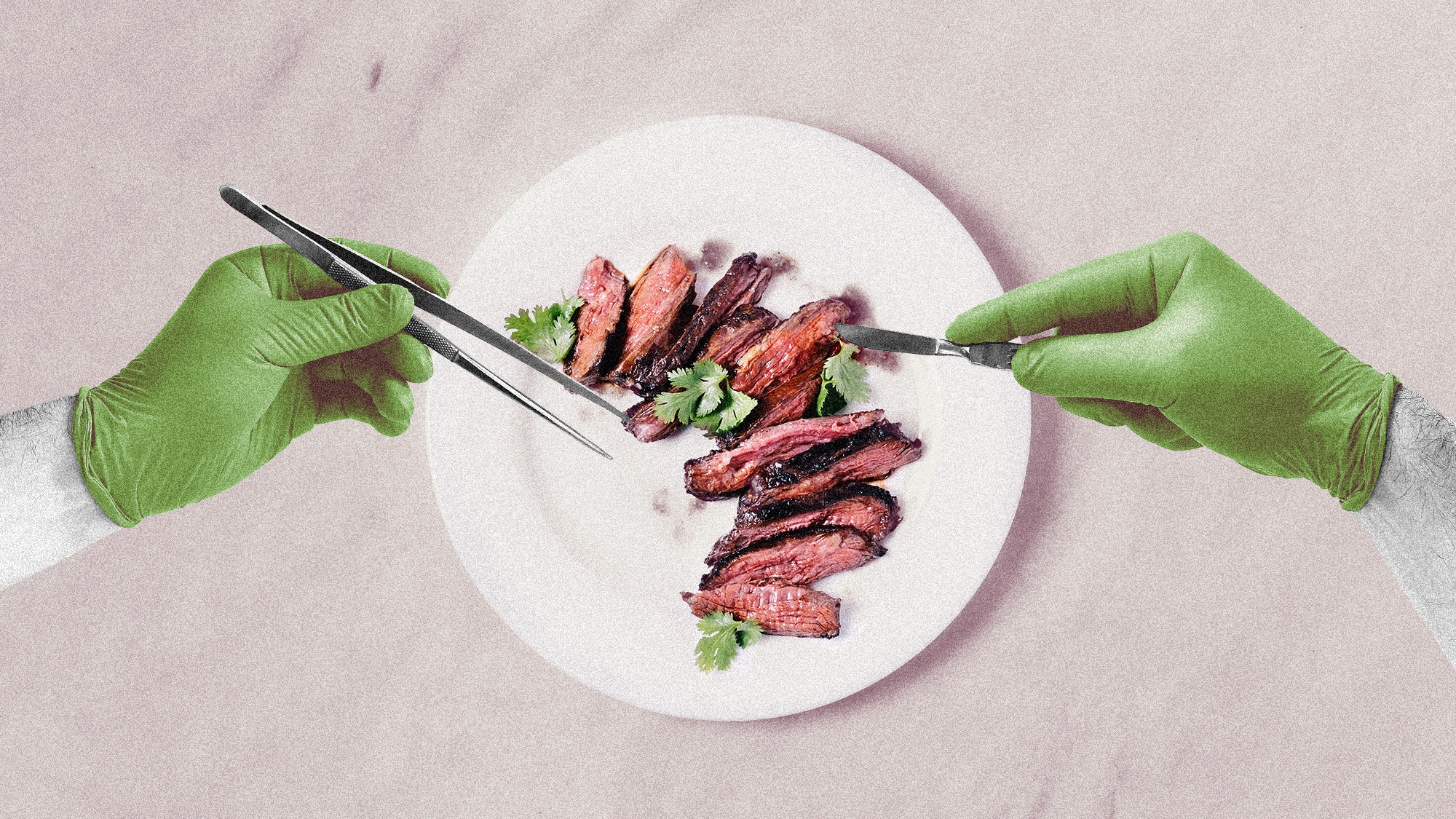The pros and cons of lab-grown meat
Researchers say synthetic meat could solve major environmental issues, but not everyone is convinced

A free daily email with the biggest news stories of the day – and the best features from TheWeek.com
You are now subscribed
Your newsletter sign-up was successful
Britain must start producing lab-grown meat in order to establish a sustainable food source for the country in the future, a think tank has said.
The Adam Smith Institute has said that the intensive meat industry is fuelling greenhouse gas emissions, and damaging the environment through deforestation and overcrowding.
Although lab-grown meat was first created in the early part of the 21st century, it is not yet sold to the public. However, there are “firms in the US who aim to have products commercially available by the end of 2018”, Sky News says.
The Week
Escape your echo chamber. Get the facts behind the news, plus analysis from multiple perspectives.

Sign up for The Week's Free Newsletters
From our morning news briefing to a weekly Good News Newsletter, get the best of The Week delivered directly to your inbox.
From our morning news briefing to a weekly Good News Newsletter, get the best of The Week delivered directly to your inbox.
Dr Madsen Pirie, president of the Adam Smith Institute, said switching to lab-grown meat could change the world.
“It's sustainable, environmentally friendly, we don't have to cut down rainforests to plant crops to feed animals if you're growing it in factories.”
But is he right? Here are the pros and cons of lab-grown meat.
Pros
Space
A free daily email with the biggest news stories of the day – and the best features from TheWeek.com
The Daily Express reports that in the UK, 85% of the total land footprint “is associated with animal products, with the land footprint of commercial lab-grown meat being 99% lower than for normal animal husbandry”.
“We can produce the same amount of meat in factories on 1% of the land it presently takes us to do it,” Prie said.
Sustainability
In America, consumers eat 26 billion pounds (13 million tons) of beef each year, which Wired says “demands a massive industrialised livestock system that is problematic for the planet”.
Worldwide, livestock “may be responsible for 15% of greenhouse gas emissions”, the magazine adds, and switching to lab-grown meat would reduce these emissions by up to 96%.
As such, it has been touted as a possible solution to global warming and climate change, and should theoretically lead to a reduction in deforestation for livestock purposes. Prie adds: “It's sustainable, environmentally friendly, we don't have to cut down rainforests to plant crops to feed animals if you're growing it in factories.”
Animal welfare
The system of farm-based meat production “rarely has the animals’ best interests in mind”, Wired says, and animal welfare in meat-producing farms and factories has long been a source of controversy worldwide.
Lab-grown meat, meanwhile, could be “environmentally and animal-welfare friendly, ethical, and less likely to carry diseases”, The Conversation suggests.
“It could increase the proportion of happy animals on Earth if it replaced intensive farm animal production. By happy, we mean well nourished, comfortable, healthy, free from pain, and able to perform.”
Health benefits
“Doing away with slaughterhouses could reduce the risk of food-borne illnesses, as well as diseases transmitted between live animals and humans,” Faunalytics says.
“In addition, lab-grown meat could easily supplemented with vitamins and minerals that are not found in natural meat.”
Cons
Trust
In a survey undertaken by The Conversation, the site found that people often have a “perception that [lab-grown meat] is unnatural”, which “may be similar to people’s concerns about genetically modified (GM) foods – some of those who oppose GM foods are moral absolutists who would not be influenced by any argument in favour”.
Job losses
Many farming bodies are “understandably against this potential threat to their livelihood - and there's some way to go to convincing some food lovers we spoke to,” Sky News says.
“There’s a very real danger that those at the bottom of the business pyramid find themselves excluded from the marketplace, if the world does embrace new, more 'ethical' meat products,” Twisted says. “Balancing the need for development in our farming practises with maintaining peoples’ livelihoods promises to be a difficult tightrope to walk over the coming years.”
Taste
Lab-grown meat could theoretically contain no fat, and would also contain no bones, which may compromise the taste to some consumers, Future For All suggests.
However, at present, little is known about the potential flavours of lab-grown meat compared to livestock-based products.
Obesity
If lab-grown meat proves to be cheaper and easier to mass-produce than traditional meat, “researchers believe it could encourage overconsumption, which could, in turn, increase obesity and related issues”, Faunalytics says.
-
 Why are election experts taking Trump’s midterm threats seriously?
Why are election experts taking Trump’s midterm threats seriously?IN THE SPOTLIGHT As the president muses about polling place deployments and a centralized electoral system aimed at one-party control, lawmakers are taking this administration at its word
-
 ‘Restaurateurs have become millionaires’
‘Restaurateurs have become millionaires’Instant Opinion Opinion, comment and editorials of the day
-
 Earth is rapidly approaching a ‘hothouse’ trajectory of warming
Earth is rapidly approaching a ‘hothouse’ trajectory of warmingThe explainer It may become impossible to fix
-
 Lab-grown meat might be about to meet its maker
Lab-grown meat might be about to meet its makerUnder the radar The controversy at the intersection of cultured meat and agribusiness
-
 Cigarette-style warning labels on meat could cut consumption, say scientists
Cigarette-style warning labels on meat could cut consumption, say scientistsSpeed Read The UK's national food strategy aims to cut meat consumption by 30% by 2032